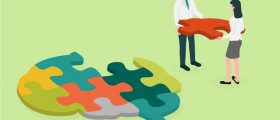
Amnesia or the loss of memory
The loss of memory is also called amnesia, and people with this problem usually cannot remember certain facts, information or even their experiences. Also, they find it difficult to learn new information, or remember new things, but they do have a sense of who they are. There is a long list of possible causes of memory loss, but they all come down to either a disease or an injury, which results in the damage of the brain structures that are in charge of controlling the memories and emotions.
The most frequent causes of the neurological or organic amnesia are encephalitis, or the inflammation of the brain, stroke, lack of oxygen in the brain, particular brain tumors, and degenerative diseases of the brain, such as, for example, Alzheimer's disease or some other form of dementia. Head injuries can also cause amnesia. Psychogenic or dissociative amnesia is another type of memory loss, and it is a result of some kind of an emotional shock or psychological trauma, but they usually don’t last long. However, generally speaking, people who are more prone to memory loss are those who had some kind of a brain surgery, stroke, or those who are alcoholics.
Symptoms of the short-term memory loss
Short-term memory loss has several characteristics, but generally, not all the people who suffer from it will have the same symptoms. While some may experience vision impairment, others will experience problems with muscular coordination, for example, particularly in cases of brain or spinal cord disorder. However, the majority of people who suffer from short term memory loss will probably face with a diminished cognitive ability, which is usually very traumatic for people, as well as for their friends and family, and they will suffer from dementia and incoherent thoughts and mental confusion. What is interesting about this problem is that people who suffer from it can understand written or spoken words, they may learn new skills as well, or even understand that they have this memory disorder.
When it comes to the coping with this problem, it is good to know that some cases can be treated, and there are even some medications that can improve the memory, but it all depends on the cause of the problem. This is why, it is necessary to consult the doctor, and to try to gather as much information as possible about the techniques and therapies, as well as with all other options that are available and that might be of at least some help in such situations.

















Your thoughts on this
Loading...